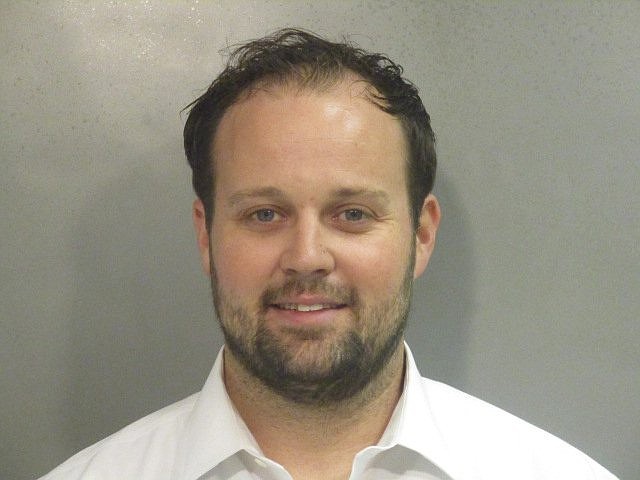A federal judge in Arkansas’ Western District did not commit reversible errors during the child pornography trial of Josh Duggar, the oldest son of the famed Northwest Arkansas Dug-gar family, according to an appeals court ruling issued Monday that affirmed Dug-gar’s 12-year prison sentence.
A three-judge panel on the 8th U.S. Circuit Court of Appeals ruled Mon-d ay t h at statements D u g ga r made early in the investigation and U.S. District Judge Timothy Brooks’ ruling that a former employee’s past sex offense conviction was not relevant had no bearing on the conviction of the former reality show star and Republican Party activist.
In a de novo review of the trial court transcript — meaning it did not consider the district court’s rulings in its review but gave consideration as though it were looking at the case for the first time — the three-judge panel affirmed Duggar’s conviction in an 11-page unanimous ruling by Circuit Judges Lavenski Smith of Little Rock; David Stras of Minneapolis; and Jonathan Kobes of Sioux Falls, S.D.
Duggar, 34, of Springdale was convicted Dec. 9, 2021, of possessing child pornography by a federal court jury in Fayetteville. U.S. District Judge Timothy L. Brooks sentenced Duggar to 12½ years in federal prison May
25. Duggar also was ordered to serve 20 years of supervised release after his prison term and to pay a $10,000 fine. Brooks also assessed three special assessment fees totaling $40,100.
Prosecutors accused Dug-gar in early 2021 of using the internet to download and view child pornography, some of which depicts the sexual abuse of children under age 12, according to court documents. They told jurors that child pornography was repeatedly downloaded on the computer at Duggar’s used car lot May 14, 15 and 16 of 2019.
Duggar was charged in federal court with two counts involving receiving and possessing child pornography. The jury found him guilty on both counts after more than six hours of deliberation over two days. Duggar was sentenced on the single count of receiving child pornography because possession of child pornography is considered a lesser-included offense under federal law.
Duggar’s attorney, Justin Gelfand, cited three issues on appeal: m “Whether the district court violated Duggar’s constitutional right to present a complete defense by precluding Duggar from calling and, if necessary, impeaching a critical witness at trial.” m “Whether the district court erred by denying Duggar’s motion to suppress statements after a federal agent physically stopped him from contacting his attorney and subsequently interrogated him outside the presence of his counsel.” m “Whether the district court erred by permitting the government’s expert to offer testimony on EXIF metadata and prohibiting Duggar’s expert from testifying to the unreliability of the methodology used by the government’s expert.” EXIF — which stands for “exchangeable image file format — Metadata is a set of data attached to photo or video files that includes information such as when and where a photo was taken and with what device.
Stras, who authored Monday’s ruling, wrote that when Duggar was asked whether he would like “to discuss further details” about the warrant, he said yes.
“Without waiting for an explanation,” Stras wrote, “Duggar blurted out, ‘[w]hat is this about? Has somebody been downloading child pornography?’ He then let it slip that he was ‘familiar with’ file-sharing software and had installed it on ‘all of’ his electronic devices, including ‘the computer in the office.’” Those statements, Stras wrote, “took on a critical role at trial,” as did the EXIF meta-data from Duggar’s iPhone, which placed it at the dealership when the child pornography was downloaded.
Stras also wrote that Dug-gar had tried to point blame toward a former employee of the car lot who had a past sex offense conviction but decided not to call him to the stand after Brooks ruled that any mention of his past conviction would be off-limits. The panel ruled that Brooks had ruled appropriately in deciding that although Dug-gar could call the former employee to testify, he would not be allowed to introduce the previous sex offense conviction in a manner that would impeach the witness.
The panel also ruled that although investigators did read Duggar his Miranda rights before questioning him at the car lot, he was informed that they were serving a search warrant rather than an arrest warrant, that he was told numerous times that he was free to go.” The order pointed out that Dug-gar had complete freedom of movement throughout the more-than-hourlong interview — that began with Duggar asking “has someone been downloading child pornography?” — and that it was terminated when Duggar ended the interview and left the dealership; “hardly an option available to someone in custody.” On the issue of metadata, Duggar challenged the qualifications of the government’s forensic analyst and the limitations placed on the testimony of his own analyst, saying Brooks abused his discretion.
The panel ruled that the government’s expert witness had demonstrated his expertise through the examination of “thousands of devices” and the writing of “hundreds of forensic reports” using EXIF metadata from files. The panel also ruled that Duggar’s expert witness was ordered to “limit her testimony to what she knew.” “Although the district court allowed her to speak generally about EXIF metadata,” the ruling said, “she could not suggest that the ‘dates and times’ were wrong. She never ‘load[ed]’ any of it ‘into [her] software.’ So, as she put it, her testimony consisted of a lot of ‘I don’t know[s].’” According to the Federal Bureau of Prisons, Duggar is serving his sentence at the Federal Correctional Institute in Seagoville, Texas — a low-security prison complex adjacent to a minimum-security satellite camp — and is scheduled to be released Oct. 2, 2032.
